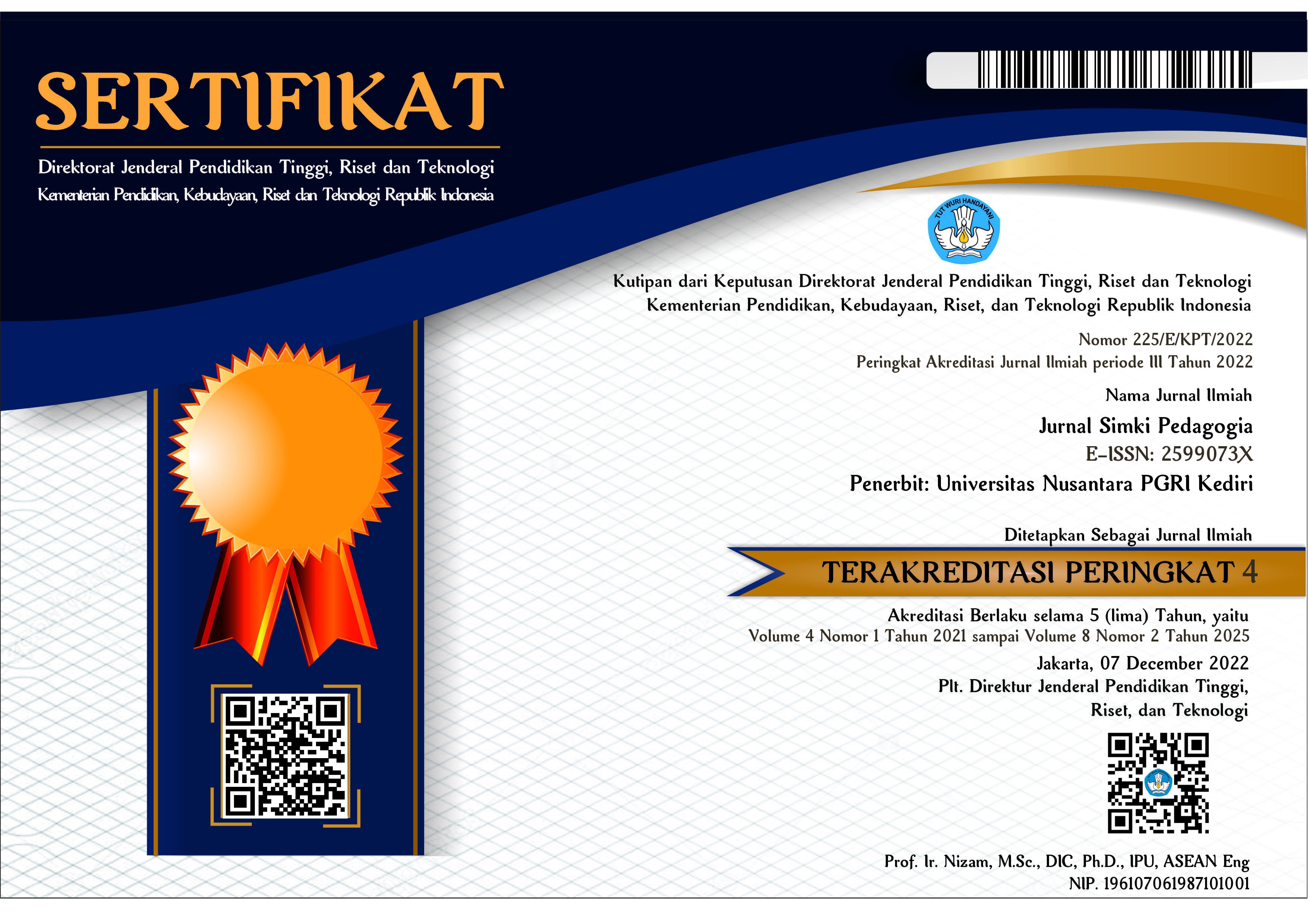Meningkatkan Hasil Belajar Ilmu Pengetahuan Alam Materi Atom Menggunakan Model Problem Based Learning (PBL) Pada Peserta Didik Kelas IXB SMP Negeri 2 Bangsalsari Jember
 Abstract views: 314
,
Abstract views: 314
,
 PDF (Bahasa Indonesia) downloads: 249
PDF (Bahasa Indonesia) downloads: 249
Abstract
The purpose of this study is to describe the increase in learning outcomes of Natural Sciences on atomic material after applying the Problem Based Learning (PBL) model in class IXB UPTD Education Unit SMP Negeri 2 Bangsalsari Jember in the academic year 2021-2022 Semester 2. The research design used is classroom action research (classroom action research) in two cycles. Each cycle consists of two meetings which include planning, action, observation and reflection. The research subjects are students of class IXB for the academic year 2021-2022 semester 2 with a total of 25 students. The research was conducted from February to March 2022. The data collection method used the test and observation method. The research carried out concluded that the increase in learning outcomes in Natural Science of atomic material after applying the Problem Based Learning (PBL) model in class IXB UPTD Education Unit SMP Negeri 2 Bangsalsari Jember in the 2021-2022 semester 2 academic year, amounted to 24% of the complete results. classical learning, namely the percentage of completeness in the first cycle of 72% increased to 96% in the second cycle. Meanwhile, the average value of students was 15.60 from the first cycle average of 74.80 which increased to 90.44. In addition, the PBL learning carried out also increases the activities of students from the high category.
Downloads
References
Amir, T. (2009). Inovasi Pendidikan Melalui Problem Based Learning. In Kencana (Vol. 1, Issue 1).
Hamalik, O. (2013). Kurikulum dan Pembelajaran Edisi 1. In Bumi Aksara, Jakarta.
Hmelo-Silver, C. E., Chinn, C. A., Chan, C. K. K., & O’Donnell, A. M. (2013). The international handbook of collaborative learning. In The International Handbook of Collaborative Learning. https://doi.org/10.4324/9780203837290
Permana, E. P., & Nourmavita, D. (2017). PENGEMBANGAN MULTIMEDIA INTERAKTIF PADA MATA PELAJARAN IPA MATERI MENDESKRIPSIKAN DAUR HIDUP HEWAN DI LINGKUNGAN SEKITAR SISWA KELAS IV SEKOLAH DASAR. Jurnal PGSD, 10(2). https://doi.org/10.33369/pgsd.10.2.79-85
Rusman. (2012). Model-model Pembelajaran. Jakarta: Rajawali Pers.
Sardiman. (2011). Interakasi dan motivasi Belajar-Mengajar. Interakasi Dan Motivasi Belajar-Mengajar, 10.
Sardiman, A. M. (2018). Interaksi dan Motivasi Belajar Mengajar (cetakan 24). In Jakarta: Rajawali Pers.
Savin-Baden, M., & Wilkie, K. (2004). Challenging Research in Problem-based Learning. In Challenging Research in Problem-based Learning.
Slameto, S. (2014). PERMASALAHAN-PERMASALAHAN TERKAIT DENGAN PROFESI GURU SD. Scholaria : Jurnal Pendidikan Dan Kebudayaan, 4(3). https://doi.org/10.24246/j.scholaria.2014.v4.i3.p1-12
Sudjana, N. (2011). Penilaian Hasil Proses Belajar Mengajar (Edisi ke-16). Sinarbaru.
Wardhani, D. (2007). Penelitian Tindakan Kelas. Jakarta: Universitas Terbuka.
Copyright (c) 2022 Widoretno Anggraeni

This work is licensed under a Creative Commons Attribution 4.0 International License.

Jurnal Simki Pedagogia : https://jiped.org/index.php/JSP/index is licensed under a Creative Commons Attribution 4.0 International License.
















